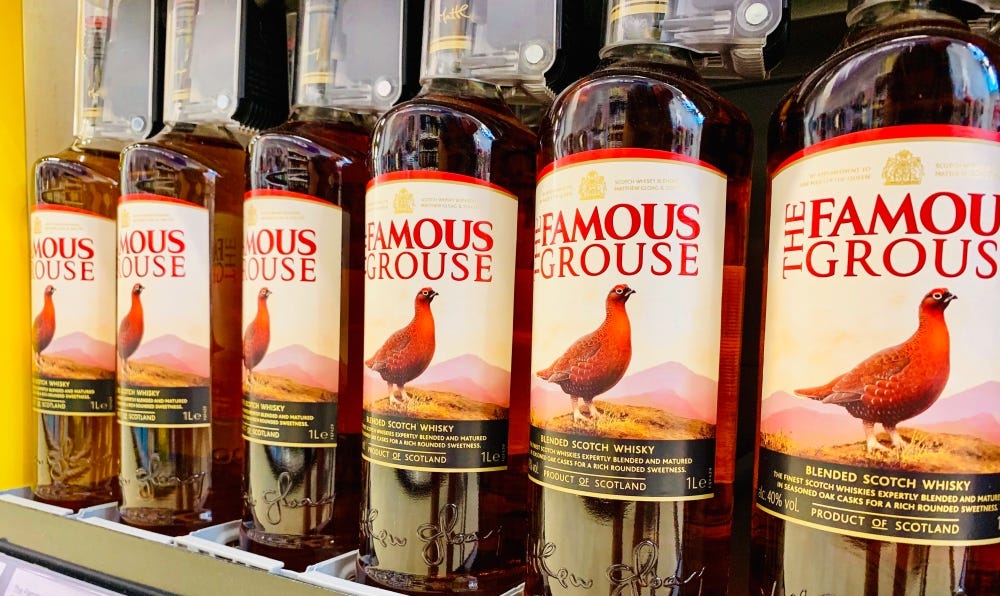The trouble with Scotland’s pricey booze
Minimum unit prices are set to rise north of the border – but it’s a policy that is both illiberal and ineffective.
Last Thursday, the Scottish government proposed that the minimum price that can be charged for drinks, per unit of alcohol, will rise from 50 pence to 65 pence. The deputy first minister, Shona Robison, declared: ‘I'm clear that alcohol continues to cause significant health harm to too many people in this country. We, as a government, are determined to do all we can to reduce alcohol harm.’ But this is an unwarranted interference in our personal choices – and the evidence suggests it won’t achieve its stated aim: to reduce problem drinking.
The minimum unit price of 50 pence was set in 2012 when the legislation was passed. But the law wasn’t implemented until 2018 because of a long-running court case brought by drinks manufacturers, which eventually made it all the way to the European Court of Justice. As a result, the minimum unit price has been eroded by inflation.
That said, those of us living north of the border are still paying considerably more for booze than those living in England. (Wales implemented minimum pricing in March 2020.) For example, let’s compare own-brand drinks at the UK’s biggest supermarket chain, Tesco. A four-pack of Tesco own-brand tins of cider costs £2.50 in England and £4.40 in Scotland. One litre of Tesco own-brand Scotch whisky costs £17.90 in England and £21.75 in Scotland.
So, there is already a substantial difference in price on either side of the border. At 50 pence per unit, minimum pricing already gets rid of cheap booze. There is no need to increase the minimum price to achieve that aim. But the new proposal would bump up the Scottish price of the cans of cider to £5.72 and the bottle of whisky to £28.28. In the home of whisky, a bottle of own-brand would cost over £10 more in Scotland than in England.
For those on low incomes who want to enjoy a drink, a litre of whisky might keep you going for a week or two without breaking the bank in England. That certainly won’t be the case after April here in Scotland.
This might be justified if minimum pricing made a serious dent in Scotland’s serious problems with alcoholism. But the evidence suggests that it won’t. Unsurprisingly, people with an addiction to alcohol who can’t afford higher prices simply cut back on other spending to maintain their habits. As Christopher Snowdon pointed out last year, the evidence of any benefit is feeble – and the policy is quite likely to be causing harm, too.
The original legislation on minimum pricing included a sunset clause, allowing the policy to lapse if it didn’t work. And it doesn’t work; it simply makes most people pay more for booze. Rather than scrap this regressive idea, SNP ministers instead want to double down on it.
But even if minimum pricing worked in its own terms, it still wouldn’t be justified. As John Stuart Mill wrote in his famous book, On Liberty:
The only purpose for which power can be rightfully exercised over any member of a civilised community, against his will, is to prevent harm to others. His own good, either physical or moral, is not a sufficient warrant. He cannot rightfully be compelled to do or forbear because it will be better for him to do so, because it will make him happier, because, in the opinion of others, to do so would be wise, or even right... The only part of the conduct of anyone, for which he is amenable to society, is that which concerns others. In the part which merely concerns himself, his independence is, of right, absolute. Over himself, over his own body and mind, the individual is sovereign.
For Mill, any such interference in our habits, thinking or statements is a denial of our individuality, our ability to be fully realised moral agents. And he specifically notes how raising prices in order to restrict our ability to purchase something – even for our own good – is a problem:
To tax stimulants for the sole purpose of making them more difficult to be obtained, is a measure differing only in degree from their entire prohibition; and would be justifiable only if that were justifiable. Every increase of cost is a prohibition, to those whose means do not come up to the augmented price; and to those who do, it is a penalty laid on them for gratifying a particular taste.
Mill’s ‘harm principle’ is much quoted by liberals. As it goes, even within the pages of On Liberty, this seemingly simple rule is qualified. After all, there is little that we do that does not have at least some impact on others. And, as I point out in my Letter on Liberty, Beyond the Harm Principle, in today’s circumstances, new harms are manufactured all the time – from the supposed threat of free speech to mental health through to the claim that our ‘bad habits’ are a threat to the NHS – which seem to narrow the scope of Mill’s principle.
Nonetheless, Mill’s principle is worth defending, especially when it comes to such bad habits as enjoying some booze. If we are to live as free and equal citizens in this society, there should not be punitive measures to restrict our personal pleasures. We should have the right to enjoy them and the responsibility to assess the benefits and risks for ourselves.
Minimum unit pricing is a terrible, illiberal and ineffective idea that should be allowed to die.
Rob Lyons is speaking at the Living Freedom University Salon ‘What can we learn from…? JS Mill: freedom and the harm principle’ on Tuesday 20 February from 6pm at King’s College, University of Aberdeen. If you would like to attend, the event is free, but please register here.




